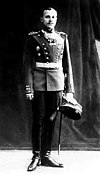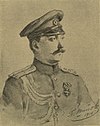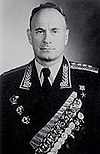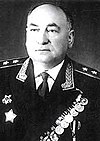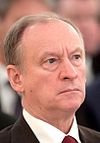Internal Security Service (Rossyiah)
| Служба Внутренней безопасности Российской Империи | |
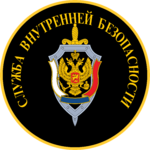 Emblem of the Internal Security Service | |
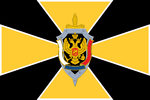 Flag of the Internal Security Service | |
| Agency overview | |
|---|---|
| Formed | 25 April 1995 |
| Preceding agency |
|
| Type | Independent |
| Jurisdiction | Tsar of Russia |
| Headquarters | 24 Kuznetsky Most, Moscow, Russia |
| Motto | SVB (СВб) |
| Employees | Classified |
| Annual budget | Classified |
| Agency executive |
|
| Website | Building details |
 Headquarters of the SVB on 24 Kuznetski Most | |
The Internal Security Service of the Russian Empire (Russian: Служба Внутренней безопасности Российской Империи, СВб РИ Sluzhba Vnutrenney Bezopasnosti Rossiyskoy Imperii SVB RI) is the principal security agency of the Russian Empire. Its main responsibilities are within the country and include counter-intelligence, internal and border security, counter-terrorism, and surveillance as well as investigating some other types of grave crimes and violations. It is headquartered in Lubyanka Square, Moscow's center. Direction of the SVB is executed by the Tsar, who appoints, dismiss and directs the Director of the SVB.
Under Russian law, the SVB is a military service just like the Imperial Russian Armed Forces, the Politsyia, the Imperial Guard, the Foreign Intelligence Service (SVR) and civil defence, but its commissioned officers do not usually wear military uniforms.
The SVB is mainly responsible for the internal security of the Russian Empire, counterintelligence, and the fight against organized crime, terrorism, and drug smuggling, whereas overseas espionage is the primary responsibility of the Foreign Intelligence Service, as well as the GRU, a body within the Russian Ministry of Defence. All law enforcement and intelligence agencies in Russia work under the guidance of the SVB, if necessary.
The SVB employs about 75,000 uniformed staff, including about 5,000 special forces troops. It also employs Border Service personnel of about 160,000–200,000 border guards.
The SVB answers directly to the Tsar of Russia and the Director of SVB reports to the president only; the Director also, ex officio, is a permanent member of the Security Council of Russia presided over by the Tsar himself and chairman of the National Anti-terrorism Committee of Russia.
History
The first internal security organization in modern sense was the relatively short-lived Third Section of the Department of executive police of the Ministry of Police. The Third Section was entrusted for carrying out of the general audits of governorates and for the execution of security-related operations. After its disestablishment in 1819, the internal security matters were dealt with by the Special Corps of Gendarmes and by the Third Section of His Imperial Majesty's Own Chancellery, established in mid-1820s. Both the Special Corps of Gendarmes and the Third Section did have severe shortcomings which resulted in the assassination of Emperor Alexander II in 1881.
Upon his accession to the throne, Emperor Alexander III established the Department for Protecting the Public Security and Order within the newly-formed Police Department. The Department was a decentralized organization, placed under the security chiefs of the major cities. Between 1906 and 1907 ten interprovincial Districts were created, but as of 1914 they were abolished except for three Districts.
SpeKo
The Russian Revolution of February 1917 and the October 1917 coup attempt sparkled the Russian Civil War and proved the inadequacy of the Okhrana and in late 1917 the Special Commission of Public Security (Russian: Специальная комиссия общественной безопасности, Spetsial'naya Komissiya Obshchestvennoy Bezopasnosti, abbreviated into SpeKo) was formed.
In the first month and half after the October coup attempt, the duty of wiping out communists and liberals in Petrograd and in territories under the Tsar's control was assigned to the Petrograd Okhrana. It was a body completely reformed working under directives of General Vlasov. One of its most important functions was the security and the fight against revolutionary activity.
The obligations of the security commission were to eradicate all of the revolutionary and sabotage activities and all attempts to them in all of Russia, to hand over revolutionaries and saboteurs to the military tribunals, develop measures to combat them and relentlessly apply them in real-world applications. In theory, the commission had only to conduct a preliminary investigation. The commission should also observe the press and counterrevolutionary parties, sabotaging officials and other criminals. Three sections were created: informational, organizational, and a unit to combat revolution and sabotage.
In January 1918, a subsection of the anti-revolutionary effort was created to police bank officials. The structure of SpeKo was changing repeatedly. By March 1918, when the organization came to Moscow, it contained the following sections: against revolution, speculation, non-residents, and information gathering. By the end of 1918–1919, some new units were created: secretly operative, investigatory, of transportation, military (special), operative, and instructional. By 1921, it changed once again, forming the following sections: directorate of affairs, administrative-organizational, secretly operative and economical foreign affairs.
In the first months of its existence, SpeKo consisted of only 50 officials. It commanded a team of soldiers. Through the winter of 1917–1918, all activities of SpeKo were centralized mainly in the city of Petrograd.
All results of its activities, SpeKo had either to transfer to the Investigatory Commission of Military Tribunal, or to dismiss. The control of the commission's activity was provided by the MVD.
On 23 February 1918, SpeKo sent a radio telegram to all governatorates under Tsarist control with a petition to immediately organize emergency commissions to combat revolution, sabotage and speculation, if such commissions had not been yet organized. February 1918 saw the creation of local Special Commissions. The Special Commissions arose, usually in the areas during the moments of the greatest aggravation of political situation.
State Security Directorate
The State Security Directorate (Управление государственной безопасности, УГб; Upravleniye Gosudarstvennoy Bezopasnosti, UGB) under the MVD was established on 6 February 1922 afer the abolition of the SpeKo with the transfer of powers to the OGB under the Ministry of Internal Affairs. Being a body of the MVD, the OGB was bound to follow, at least officially, procedures of law.
On 3 February 1941 the Special Sections of the UGB (responsible for counter-intelligence in the military) became part of the Army and Navy. On 20 July 1941 Army and Air force counter-intelligence was returned to the MVD as Directorate of Special Departments under Anakumov, in January 1942 Navy counter-intelligence followed. In April 1943 it was again transferred to the Ministries of Defence and of the Navy. The OGB was disestablished in 1945 by Prime Minister dzе Jughashvili and it was replaced by the Ministry of State Security.
Ministry of State Security
The Ministry of State Security (Russian: Министе́рство Госуда́рственной Безопа́сности PИ, МГБ; Ministerstvo Gosudarstvennoy Bezopasnosti RI, MGB) was the name of the Russian state security apparatus dealing with internal and external security issues: secret police duties, foreign and domestic intelligence and counterintelligence, etc. from 1945 to 1953.
In 1945 dzе Jughashvili retired due to health concers and his close associate Anastas Mikoyan was appointed by Alexei II as Chairman of the Council of Ministers. Among the first tasks of the new prime minister there was the reorganization of the security apparatus. The counter-intelligence and foreign espionage emerged as powerful power-brokers. In order to control their heads and to associate them in the definition of the general policy of the government, Mikoyan struggled with Alexei II to convert the OGB into a full-fledged Ministry. Eventually, he managed in his intent and on 9 June 1945 the Ministry of State Security was established.
The MGB essentially inherited the "secret police" function of the old UGB, conducting both foreign espionage and counterespionage, as well as enacting a policy of supervision and surveillance to keep control and to prevent disloyalty. After World War II, the MGB was used to bring the newly acquired Eastern European countries under Russian control. It enforced rigid conformity in the satellite states of Eastern Europe and infiltrated and destroyed communist, Republican or otherwise independent groups.
The protection, policing, and supervision of the Russian Empire fell to this new agency, as it was the main agency responsible for the security of the Empire.
The MGB directed espionage networks at home and abroad, and also organized both domestic and foreign counterintelligence. They were also responsible for enforcing security regulations, monitoring and censoring information leaving or coming into the country; and supervising the majority of Russian life, including the planting and organizing of agents to track and monitor public opinion and loyalty; as well as ensuring the safety of the Tsar (alongside the Russian Imperial Guard) and of important government and IRO officials.
The MGB, above all else, was a security organization, and as such, was designed for covert and clandestine surveillance and supervision. The intelligence apparatus was able to permeate every level and branch of state administration, with agents planted in collective farms, factories, and local governments, as well as throughout the upper level and rank and file of Russian bureaucracy. Each department within the government also had their own official supervisor, a "Special Section" staffed by the MGB to keep tabs on and regulate the employees, and to ensure the absence of disloyalty.
The Ministry retained a high level of autonomy and a remarkable amount of freedom of operation within the Soviet system, as the agency was de facto responsible only to prime minister Mikoyan. The Special Council of the State Security Ministry convicted arrestees charged with committing political crimes, including espionage, and could banish them from certain areas, or from Russia entirely.
State Security Service
The dzе Jughashvili's death in early 1953 left Anastas Mikoyan without any significant political ally willing to assume the burden of obstructing the Tsar Alexei II's clear will to recover the reins of the coercive power of the Russian state. This was also in order to counter Western progressive-liberal propaganda. On 3 June 1953, Count General Grigory Alexandrevich Gagarin was appointed Minister of Internal Affairs. On 8 July, Minister of State Security Vasily Margelov was dismissed. Despite a brief attempt by Mikoyan to assume the portfolio ad interim, on 15 August General Dmitri Sheremetev was appointed. After this government reshuffle, the majority of Duma shifted from Mikoyan to the "legitimist" faction.
The Mikoyan's political fate was thus sealed. In late August, a well-orchestrated scandal erupted on major newspapers, framing Mikoyan with accusations of embezzlement. On 8 September 1954, Prince Nikolai Aleksandrevich Vorontsov-Dashkov was appointed Chairman of the Council of Ministers. Vorontsov, as he was known, was a senior leader of the Imperial Revolutionary Organization with economically socialist views.
With Mikoyan gone, the Ministry of State Security was reorganized as a "Service", i.e. subordinated exclusively to the Tsar.
The State Security Service (Russian: Служба Госуда́рственной Безопа́сности PИ, CГБ; Sluzhba Gosudarstvennoy Bezopasnosti, SGB) was established in 1954 in order to serve as the “sword and shield of the Tsar.” The new security service, which played a major role in the purge of Mikpyan and dzе Jughashvili’s supporters, was designed to be carefully controlled by the Tsar ans his close associates. It was divided into approximately 20 directorates, the most important of which were those responsible for foreign intelligence, domestic counterintelligence, technical intelligence, protection of the state leadership (but not of the Tsar), and the security of the country’s frontiers. In the late 1960s an additional directorate was created to conduct surveillance on suspected dissidents in the Orthodox Church and other churches and faiths and among the intelligentsia. For the next 20 years the SGB became increasingly zealous in its pursuit of enemies, harassing, arresting, and sometimes exiling human rights advocates, Jewish activists, and intellectuals perceived to be disloyal to the regime.
The SGB gradually expanded its foreign intelligence operations to become the world’s largest foreign intelligence service. As the Cold War with the United States intensified, the SGB came to be viewed as a counterpart of the U.S. Central Intelligence Agency (CIA); however,the SGB conducted most of its activities domestically, on Russian soil and against Russian subjects. The SGB’s many agents sometimes posed as businessmen and journalists, though many used the more conventional diplomatic cover. Its successes included the infiltration of every major Western intelligence operation and the placement of agents of influence in almost every major capital. The SGB also was able to procure scientific and technical information for the Soviet military, and it repeatedly obtained advanced technology necessary for the development of Russian submarines, airplanes, and rockets. Along with the GRU (Chief Intelligence Directorate of the General Staff), which was responsible for military operations, the SGB enjoyed tremendous access to the secrets of both its adversaries and its allies.
By the end of the 1960s, the SGB had become firmly established as the Tsar’s inner circle security watchdog. Its value as an instrument of control was reflected in the appointment of its longtime head, Valery Ivanov, to the Bureau of Political Affairs and his succession to the head of the government in 1982 under Tsar Aleksandr IV. Under Ivanov, the KGB recruited the “best and the brightest” members from the establishment.
Inside Russia, the attitude of the SGB toward suppressing dissent was largely dictated by government policy. During the ministries of Vorontsov-Dashkov (1953-1964), a certain amount of pro-liberalism was tolerated. The pendulum swung the other way with the ascension of Mikhail Platov in 1964, and, especially, the ascension of Aleksandr IV in 1978.
The authoritarian phase of Aleksandr IV did not last long. In the late 1980s, the Empire began to enter in suffering with rampant inflation, and agitation by subject peopoles. Premier Nikolai von Holst (1984-1991) had already implemented a restructuring of the economy and political structure a policy of openness toward dissidents. This enraged some conservative circles.
Creation of the SVB
In 1995, the SGB was renamed and reorganized into the Internal Security Service (SVB) by Alexander IV. The decree made the tasks of the SVB more specific, giving the SVB substantial rights to conduct cryptographic work, and described the powers of the SVB director. Alexander IV appointed Colonel-General Mikhail Ivanovich Barsukov as the new director of the SVB. In 1998 Alexander IV appointed Vladimir Putin, a SGB veteran, as director of the SVB.
The SVB is engaged in the development of Russia's export control strategy and examines drafts of international agreements related to the transfer of dual-use and military commodities and technologies. Its primary role in the nonproliferation sphere is to collect information to prevent the illegal export of controlled nuclear technology and materials.
List of chairmen of the internal security
Internal security powers
In order to carry out its missions, the Internal Security Service has several powers, both overt and covert. At the base of the vast powers, legal and illegal, attributed to the Internal Security Service there is the idea that sees the protection of the supreme good of the Tsar and of the Russian Empire being sometimes incompatible with the legal protections of the rule of law. When the supreme interest of Russia is at stake, for the Motherland everything is permitted. Because of specific requirements preventively defined, there may be some real suspension of the right and some behaviours, in itself criminal, may be considered appropriate within particular contexts, due to the defence of the Fatherland.
The Internal Security Service can perform arrests ordered by a court, as well as making official arrests on its own behalf. It can also perform searches, seizures, detentions, interrogations and arrests measures. If the Internal Security Service makes an arrest or a search on behalf of a Court - a rare but possible eventuality - ordinary police procedures are followed; conversely, no constraint is placed on security procedures. Often, during security investigations, if an arrest takes place, it involves also relatives of the suspect or of the fugitive.
In addition to the official acts, which provide not guarantees or individual, Imperial Security may adopt any measure that is deemed appropriate to ensure the fulfilment of the missions. If deemed necessary, Imperial Security could engage in targeted killing, and hunt down and kill enemies abroad.
The Internal Security Service has the power to arrest or secretly abduct a person and imprison him or her. The person is placed outside the law: the person imprisoned is extra-legally detained and, if deemed necessary, tortured during interrogation. The possible murder is surreptitious, with the corpse disposed of to escape discovery, so that the person apparently vanishes. The terror situation which is created, also helps to intimidate local populations, in case of active resistance.
In order to ensure an efficient prevention web, Imperial Security officers have the power to issue official warnings to citizens on actions that could lead to committing crimes and arrest people for 15 days if they fail to comply with legitimate orders given by the officers after an official warning.
Internal security and Crime fighting
The very core of the SVB mission is aimed to the defence of the Russian Empire and its institutions against whoever tries to threaten them, and from all subversion attempts and matters involving organised crime. This task make the crime fighting a mere consequence of the former: the intelligence bodies often co-operate with both Police and courts, but crime is fought by the Internal Security Service as a challenge to Imperial overrule more than on grounds of legal reasons. The SVB is not a super-cop agency, but it is a political security organisation, which cooperates with other agencies to fight crime.
1998 Internal Security Act
In order to enhance the ability to fight terrorism and internal subversion, a whole set of laws have been established since long time. Citizens must communicate what they know about terrorist activities, coups or conspiracies and murders of statesmen and armed uprisings, otherwise facing jail; telecom operators are obliged to store information about conversations between users for three years and the content of their correspondence, including videos, for a full year and such information must be provided to security organs at their request. For instant messaging programs and social networks are worth the same obligations. Finally, in case of use of encrypted messaging programs, the internet has to provide to the SVB keys for decoding. Failure to disclose such information is punishable by a fine of up to one million marks.
Permission for investigation
Pursuant to 1992 Internal Security Act, investigation of SVB members, in course of their duties, due to crimes that have derived from the nature of their duty or that are alleged to be committed during the conduct of their duty or due to allegations of crimes, requires the permission of the Prime Minister.
Permission for testimony
Giving testimony by the SVB members is subject to the permission of the Director of the Internal Security Service. The fact that the SVB members may not give their testimony concerning State secrets that they have learnt in course of their duties without receiving the permission of the Director of the Internal Security Service serves the aim of protecting State interests.
Central organization
The central bodies of the Internal Security Service include:
- Office of the Director;
- Current Information and Analysis Service;
- Current Information Group;
- Current Information and Analysis Service;
- First Deputy Director;
- First Deputy Director, Chief of the Border Guards;
- Deputy Director, Chief of Staff of the National Antiterrorist Committee (NAK
- Deputy Director, State Secretary of the SVB;
- First Service - Counterintelligence Service (SKR);
- Second Service - State Security and Antiterrorism (SGBA);
- Third Service - Border Service (PS);
- Fourth Service - Economic Security Service (SEB);
- Fifth Service - Service of operational information and international relations (SOIMO);
- Sixth Service - Service Organizational and Personnel Affairs (SOKV);
- Seventh Service - Operations Support Service (ODS). Engaged in economic and construction support for the SVB.
- UMTO (Department of Logistics)
- Capital Construction Department
- Military Construction Directorate
- Financial and economic management
- Armament Department, Technical Inspection and Fire Supervision Service (OViSPN)
- Regional divisions
- Directorate of Aviation
- Directorate of Railway Communications;
- Directorate of Road Transportations;
- Office "M" (counterintelligence support of the Ministry of Internal Affairs of Russia, the Ministry of Justice and other bodies).
- First Service - Politsyia
- Second Service - EMERCOM
- Third Service (supervised by the Ministry of Justice and the Penitentiary Service)
- Internal Security Administration
- First service (control of the Turkestan SVB)
- Second service (control of units subordinate to the Turkestan SVB)
- Third service (control of regional departments of the SVB)
- Fourth service (control of seconded SVB officers)
- Fifth service (state protection of witnesses, operational support of criminal cases)
- Administrative Control Service (SAK) - scheduled inspections and financial audits in SVB divisions.
- Inspection Department
- Control and audit department
- Personnel Inspection
- Litigation Department
- Legal Department;
- Investigation Department (SU): it is the main overt investigative body of the SVB; the central organization supervises investigative sections in SVB regional directorates;
- Operational search units Directorate: it groups surveillance units;
- Centre for Special Equipment Directorate: it groups special squads, including bomb squads;
- Sixteenth Centre for Radio-electronic Intelligence on Communications (electronic intelligence);
- Radio counterintelligence Centre;
- Communications Security Center: it is in charge of software protection of government communications;
- Scientific and technical service (STC)
- Department of Registration and Archival Funds (URAF)
- Directorates (departments) of the SVB of Russia for individual regions and constituent entities of the Russian Federation (territorial security agencies)
- other directorates (departments) of the SVB of Russia exercising certain powers of this body or ensuring the activities of the bodies of the SVB of Russia (other security bodies)
- Special-purpose units, SVB-controlled enterprises, research, expert, forensic and other institutions or units designed to support activities federal security service
- Directorate of Assistance Programs: it is in charge for disinformation operations;
- Centre for Public Communications;
- Public Relations Office;
- Centre of Special Communications - A.Presnov
- Directorate of Registry and Archives;
- Military Medical Directorate
- Military Mobilization
- Academy of the SVB and Training Directorate;
The SVB also has administrations in the armed forces and other military institutions. Sub-departments exist for areas such as aviation, special training centers, forensic expertise, military medicine, etc.
Besides the services, departments and directorates, the territorial directorates of SVB in the Governorates are also subordinate to it. Of these, Petrograd and Petrograd Oblast Directorate of SVB and its predecessors have played especially important roles in the history of this organization.
The four Governorates-General have a special Delegation each. These Delegations provide local coordination of the detached services, activities and operations.
Counterillegence Service
The First Service - Counterintelligence Service (Russian: Первая Cлужба - Служба Контрразведки ПC-СК Pervaya Sluzhba - Sluzhba Kontrrazvedki PS-SKR) is the branch tasked with countering espionage and disoloyality in Russia. Aside from combating espionage, the activity of the Counterintelligence Service is focused on ensuring the safety of Russian institutions and citizens abroad, the movement of foreign citizens in and out of the Russian Federation, fighting illegal immigration, operations to close the state borders, and investigation activity. In addition, the Service works together with relevant sections of the FSB on measures to ensure the safety of foreign states' official representation on Russian soil. The First Service is subdivided into seven Directorates:
- Directorate of Counterintelligence Operations (UKO);
- Division of Coordination and Analysis of Operations (UKAO);
- Directorate of Military Counterintelligence (UVK). The Directorate supervises the Ministry of Defence, the General Staff and the Russian Guard. UVK officers are located in each Military District and some individual military units, as well as assigned to the main headquarters of the Airborne Forces, the GRU Senezh base and Russian military bases abroad.
- Operational management;
- SVB Division for the General Staff;
- SVB Division for the GRU;
- SVB Division for Air Force;
- SVB Division for Russian Guard;
- SVB Division for Military Academies and Research Institutes;
- SVB Division for Military Districts: Central; Northern; Western; Caucasus; Southern; Eastern;
- SVB Divisions for the Northern Fleet, Pacific Fleet, Black Sea Fleet, Baltic Fleet;
- SVB Division for the Strategic Missile Forces;
- SVB Division for the Special Operations Forces.
- Division of Coordination and Analysis of Operations (UKAO);
- Directorate of Information Support for Operational Investigative Activities (UIOORD);
- Directorate of Special Events (USM);
- Directorate of counterintelligence at Facilities (UKY);
- Information Security Directorate (UIB);
- Directorate of Special Activities (USD);
- Centre for Licensing, Certification and Protection of State Secrets (TsLSZGT).
Centre for Licensing, Certification and Protection of State Secrets
The Centre for Licensing, Certification and Protection of State Secrets (Russian: Центр Лицензирования, Cертификации и Защиты Государственной Тайны, ЦЛCЗГТ; Tsentr Litsenzirovaniya, Sertifikatsii i Zashchity Gosudarstvennoy Tayny, TsLSZGT) in the structure of the internal security service is the head unit authorized to organize and carry out licensing of the activities of enterprises, institutions and organizations. The TsLSZGTalso participates in the regulation of the import into the Russian territory and export outside its borders of encryption means and special technical means intended for secretly obtaining information.
The SVB of Russia has a certificate from the State Standard of Russia for the right to certify information security equipment in accordance with the security requirements of information constituting state secrets. The Centre organizes certification of information security systems and accreditation of testing laboratories.
State Security and Antiterrorism Service
The Second Service - State Security and Antiterrorism Service (Russian: Вторая Cлужба - Служба Государственной Безопасности и Aнтитеррора, BC-CГБA; Vtoraya Sluzhba - Sluzhba Gosudarstvennoy Bezopasnosti i Antiterrora, VS-SGBA) is the very heart of the SVB and carries out one of its core missions, i.e. providing security to the Empire and to the Tsar, as well as eradicating terrorist organizations. The SGBA is subdivided into four Directorates:
- Directorate for Countering Terrorism and Political Extremism (UPTPE);
- Directorate for the Fight against International Terrorism (UBMT);
- Organizational and operational management Directorate (UOOU);
- Operational Investigation Directorate (ORU).
The Service also controls "official" special forces unit of the SVB. The Special Purpose Groups "Alpha" and "Vympel" cover all Russia, while the other three Groups have a geographic focus.
- Special Forces Centre (TsSN):
- Special Purpose Group "A" ("Alpha");
- Special Purpose Group "B" ("Vympel");
- Special Purpose Group "L" ("Lev-Turkestan");
- Special Purpose Group "K" ("Kavkaz");
- Special Purpose Group "T" ("Tavrida");
- Service for the use of special weapons.
Border Service
The Third Service - Border Service (Russian: Третья Cлужба - Пограничная Cлужба, ТC-ПC; Tret'ya Sluzhba - Pogranichnaya Sluzhba, TS-PS) is a branch of Internal Security Service tasked with patrol of the Russian border. The Border service numbers around 260,000 active members, which includes the Russian maritime border guard units (i.e., the coast guard).
Responsibilities of the Border Guard Service include the defence of the Russian national border, preventing of illegal crossing of the land and sea border by people and goods (smuggling), protecting of economic interests of the Russian Imperial and its natural resources within land and sea border areas, territorial waters and internal seas, including prevention of poaching and illegal fishing. The Border Service also combats any threats to national security in the border area, including terrorism and foreign infiltration. Functions of the border guards include not only patrolling the border, but also intelligence.
The TS-PS includes:
- Command: the head of the Border Service is by law Deputy Director of the SVB;
- First Deputy Head of the Border Service - Head of the Operations Department;
- First Deputy Head of the Border Service - Head of the Organizational Department;
- Operations Directorate;
- Regional Border Directorate for the North-West
- Regional Border Directorate for the South-West
- Regional Border Driectorate for the Grand Duchy of Finland;
- Regional Border Directorate for the Arctic Sea;
- Regional Border Directorate for the Far East;
- Regional Border Directorate for the Caucasus Viceroyalty;
- Regional Border Directorate for the Central Asia;
- Border Forces Academy of the PS-SVB
- Military Medical Institute;
- Golitsynsky Military Institute of the Border Service;
- Cadet Corps of the Border Service
Enterprises, institutions and organizations which are subordinate to the Border Service:
- Medical and health institutions;
- Repair plant;
- Logistics bases;
- Russian Coast Guard.
Economic Security Service
The Fourth Service - Economic Security Service (Четвертая Cлужба - Служба Зкономической Безопасности, ЧC-СЗБ; Chetvertaya Sluzhba - Sluzhba Ekonomicheskoy Bezopasnosti, ChS-SEB) supervises and protects crucial industries and companies. It covers a wide range of tasks and functions, from combating organised crime and corruption to the provision of operational escorts to the implementation of major economic projects and state programmes.
- Administrative Service;
- Directorate for counterintelligence support of industrial enterprises ("P");
- Directorate for counterintelligence support of transport and communications ("T");
- Directorate for Counterintelligence Support of the Credit and Financial System ("K");
- Directorate for combatting contraband and illegal drug trafficking;
- Directorate for combating illegal trade in explosives, chemical and poisonous substances;
- Directorate for the fight against counterfeiters and falsification of migration documents);
- Directorate for the fight against organized crime adm thieves in law
- Organizational and analytical Directorate (OAU).
Service of operational information and international relations
The Fifth Service - Service of operational information and international relations (Пятая Cлужба - Служба Oперативной Информации и Международных Oтношений, ПC-СOИМO; Pyataya Sluzhba - Sluzhba Operativnoy Informatsii i Mezhdunarodnykh Otnosheniy, PS-SOIMO) is responsible for providing assessments to the SVB leadership and the Kremlin and oversees intelligence operations and international activity. The Service operates abroad, its employees work as advisers in many Russian embassies and trade missions. The SVB interacts with 204 special services, law enforcement agencies and border structures of 104 states. The fifth service interacts with the CIA, FBI , Mossad , RND (Germany). Cooperation takes place within the framework of the fight against terrorism, cybercrime and organized crime.
The SOIMO is subdivided into six major subunits:
- Operational Information and International Relations Directorate (SOIiMS);
- Analysis, Forecast and Strategic Planning Directorate (UPSP);
- Department for the Coordination of Current Information;
- Directorate of Operational Information (UPI);
- Analytical management Directorate;
- International Cooperation Directorate (UMC);
- Department of Unclassified Information
- APSVB (apparatus of SVB representatives in foreign states).
Service of Organizational and Personnel Affairs
The Sixth Service - Service of Organizational and Personnel Affairs (Шестая Служба - Служба по Oрганизационным и Кадровым Вопросам, ШC-COКВ ; Shestaya Sluzhba - Sluzhba po Organizatsionnym i Kadrovym Voprosam, ShS-SOKV) is responsible for human resources and personnel management of the SVB. It is subdivided into three Directorates.
- Personnel Directorate;
- Organizational Planning Directorate;
- Directorate of Special Registrations.
Field offices
The Internal Security Service operates over 200 regional Directorates in Governorate capial cities and other cities throughout the Russian Empire. Many of these Directorates are further subdivided into smaller Detachments which have jurisdiction over a specific area. These Detachments are considered to be part of the primary Directorates. The SVB headquarters control the flow of the agents and support staff that work out of the Territorial Directorates across Russia. The field offices are also the subdivision tasked with open investigations.
Each Territorial Directorates is subdivided into five branches: territorial Detachments, the Judicial services Unit, the official Investigative Unit, the secretive Informers Unit and the Preventive Detention Unit. Below these four sections, and within all of them, each central Service has a corresponding Section. If the central Service is particularly unimportant within the Directorates boundary, it has only a dedicated officer.
To fulfil its remit, the SVB also functions at the regional and local levels and it works closely also with territorial branches of the Anti-Estremism Directorate.

